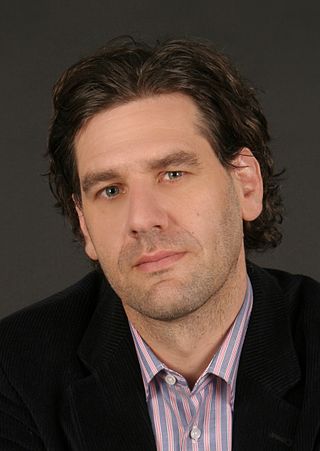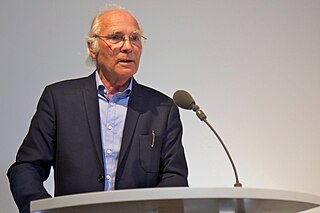Karin Friedrich is a German historian, a professor in history at the University of Aberdeen King's College.

Claudia Crawford is a German politician of the Christian Democratic Union (CDU), who became the youngest cabinet minister in German history whilst in office from 1994–98 and was Federal Minister for family, seniors, women and youth affairs and, by virtue of this office, presided over the European Union Council of Ministers. Nolte is a Catholic and is active in the Catholic community. She is married to investigative journalist David Crawford of CORRECT!V. With her marriage in July 2008, she took the name of her husband.

Jochen Böhlerlisten is a German historian, specializing in the history of Eastern Europe in the 19th and 20th century, especially the World Wars, the Holocaust, nationality and borderland studies. He is the recipient of several international awards. and known to a larger audience due to frequent appearances in TV productions and articles in national newspapers such as, for example, Frankfurter Allgemeine Zeitung or DIE ZEIT. His main thesis on the beginning of WWII and the end of WWI in Eastern Europe has been discussed vividly in German, English, and Polish academic circles.
Burghart Schmidt is a German historian. Vice-President of the University of Montpellier III.

The siege of Stralsund was an armed engagement between the Electorate of Brandenburg and the Swedish Empire from 20 September to 15 October 1678, during the Scanian War. After two days of bombardment on 10 and 11 October, the severely devastated Swedish fortress of Stralsund surrendered to the Brandenburgers. The remainder of Swedish Pomerania was taken by the end of the year, yet most of the province including Stralsund was returned to Sweden by the terms of the Treaty of Saint-Germain-en-Laye and the Peace of Lund, both concluded in 1679.

Landestrost Castle is a castle in the Weser Renaissance style that was built between 1573 and 1584 in Neustadt am Rübenberge in the north German state of Lower Saxony. Integrated into fortifications, together with the town, it developed into an urban fortress typical of the 16th century. The castle was the representative residence and administrative headquarters of its master, Duke Eric II of Brunswick-Lüneburg. During the construction period from 1574 he renamed the town of Neustadt as Landestrost, something which was reverted after his death in 1584.

Hans Heinz Holz was a German Marxist philosopher.
Ingo Haar is a German historian. He received his Master of Arts from the University of Hamburg in 1993 and his PhD in History in 1998 at the Martin Luther University of Halle-Wittenberg. His doctoral dissertation was on "Historians in Nazi Germany: the German history and the`'Ethnic struggle' in the `East'".
Heinz Schilling is a German historian.
Walter Kuhn, was an Austrian-born German folklorist, historian and Ostforscher. Prior to World War II, Kuhn belonged to the German minority in Poland. His academic work specialized in German minorities outside Germany, particularly in the area of Ukraine, especially Volhynia. He focused his research on German language islands. In 1936, Kuhn moved to Germany to take a professorship at the University of Breslau. In 1940, he joined the Nazi Party. During the war, he advised various Nazi plans of ethnic cleansing aimed at Jews, Poles and their replacement by German settlers from further east.

Hans Joachim Schliep is a German Lutheran theologian, pastor and author. From 1990 to 1999 he was director of the Amt für Gemeindedienst, and by May 2000 the commissioner for the environment of the Church of Hanover and the Confederation of Protestant Churches in Lower Saxony. From 1999 to 2008 Schliep was the first pastor at the Kronsberg Church Centre and founder of the congregation at the Expo-neighbourhood in Kronsberg, Hanover, Lower Saxony, Germany.

Rebekka Habermas is a German historian, professor of modern history at the University of Göttingen, in Germany. Habermas has made substantial contributions to German social and cultural history of the 19th century.
Renate Dürr is a German historian and academic. Her research focuses on Lutheran church spaces, religious history, the history of European expansion, the history of translation, Jesuit reductions, reciprocal cultural transfers, confessionalization, and women and gender history of the early modern period.
Heide Wunder is a German historian.
Ulrich L. Lehner is the Warren Foundation Professor of Theology at the University of Notre Dame. He is a trained philosopher, theologian and historian.
Sigrid Jahns is a German historian. Until 2009 she was professor of early modern history at the Department of History of the Ludwig Maximilian University of Munich.

Hans-Georg Fleck is a German historian and former Country Director at Friedrich-Naumann-Stiftung für die Freiheit (FNF).

Michael Stolleis was a German jurist and historian. He was a law professor at Goethe University Frankfurt until 2006 and directed the Max Planck Institut für Europäische Rechtsgeschichte of the Max Planck Society from 1991 to 2009.
Thomas Wünsch is a German historian.

Helmut Bley is a German historian. He is professor emeritus for modern and African history at the historical seminar of the Leibniz University Hannover.









